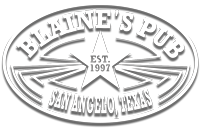$10 Cover, and we're celebrating Texas Independence!
Dirty River Boys
It happened during an ordinary refueling stop for the Dirty River Boys, the band on its way from Austin to Tulsa to kick off a six-date run. The van pulled up at a gas station and its occupants scattered, with Colton James hopping on his skateboard and heading over to a grocery store for a rotisserie chicken.
But the board hit an oil patch and went flying, and the bassist found himself not just down, but possibly out. “I see him at the van and he’s got a bone about to pop out of his shoulder, and our tour manager is on the phone,” recalls drummer Travis Stearns.
So the band retreated to Austin, where an ER doc told James he had a shattered collarbone and would need surgery. In the meantime, they outfitted him with a sling. For a moment the band contemplated scratching its upcoming six-date run, because for a stand-up bassist, a collarbone tends to be necessary equipment. “Every time I lifted my arms to play the bass I could just feel the bones crunching on each other,” he says.
But he didn’t want to force his bandmates to cancel shows. Why don’t I play the electric bass instead, he wondered, while sitting in a chair? Wouldn’t that work? The band agreed, and they were off again. “That was a long bumpy drive with a broken collarbone,” James wryly recalls. “Didn’t even stop to get any medication on the way—that was a bad idea. “
But that’s the Dirty River Boys ethos. Playing upwards of 200 dates a year, giving heartfelt, unrestrained performances, and winning over a loyal audience show-by-show, it takes a lot more than a few broken bones to stop them.
Perhaps that has a little something to do with the band’s hometown. El Paso, home of the “dirty river” known as the Rio Grande, is a place of schemers and strivers—not all of them on the right side of the law. Perhaps the quintessential American border town, the place locals call “El Chuco” is practically one city with its Mexican twin, Ciudad Juárez. Viewed from the air, only the path of the river delineates where one ends and the other begins.
It was against this backdrop that Nino Cooper, Marco Gutierrez and Travis Stearns came of age, playing music in various bands, dreaming of recording at Sonic Ranch—the mammoth residential studio just outside town—and hearing wild stories of drug wars and lawlessness from just a few miles away.
Fast forward a decade or so and Cooper had returned to El Paso from Southern California, where he’d abandoned a corporate career. Armed with an acoustic guitar and armload of originals and covers, he began playing anywhere that would have him, including restaurants and hotel lobbies. Stearns quickly jumped aboard to provide percussion, but venues weren’t crazy about a loud drum kit. So Stearns dropped the kit and picked up the cajón, a simple, box-like instrument common south of the border.
Marco Gutierrez, veteran of a number of local bands, soon rounded out the trio, and gigs in hotels and restaurants soon became bookings in El Paso’s handful of live-music clubs, which after awhile led to trips out of town.
“There’s definitely a lot of talent in El Paso,” Cooper says. “But being in a band, it’s hard to get out of there because it’s a nine-hour drive to get anywhere.”
Young, hungry and—literally—driven, the trio nonetheless buckled up for long van rides and soon began venturing to Austin, San Antonio, Tulsa and points beyond. Meanwhile a hard-driving roots-acoustic sound—which at the time, wouldn’t sound out of place on a playlist with the Avett Brothers and Mumford and Sons—began getting battle tested over an endless string of shows and hundreds of broken cajón heads.
Along the way The Dirty River Boys notched a number of significant milestones, opening for legend Willie Nelson several times, and selling out the famed Gruene Hall in New Braunfels, Tex.
Having left the El Paso restaurants far behind, the band continued to grow, adding stand-up bassist Colton James and functioning just a bit more like a conventional rock band, though one without the usual dynamic.
“This isn’t a thing where it’s a frontman and his band; it takes all four of us to do what we do,” Stearns observes. “If one of us quits or whatever, there’s no more Dirty River Boys.”
Indeed, The Dirty River Boys have an incredible number of strengths. All four members have a hand in the songwriting, and all four sing as well, while members often switch off instruments during shows. This isn’t just a vehicle for a songwriting frontman, with an interchangeable crew of instrumentalists bringing those ideas to life.
And so, after a pair of EPs and an album, “Science of Flight,” that served as a tour calling card, the time couldn’t be better for an anthemic, hook-laden declaration of intent, served up to an audience beyond DRB’s Texas diehards. And thanks to the golden-eared production assistance of Chris “Frenchie” Smith, that’s exactly what “The Dirty River Boys” is.
The record is both a cohesive statement and a dizzying testament to the band’s capabilities, as it shifts gears between genres with the skill of a long-haul trucker. There’s traditional, honky-tonk country (“Didn’t Make The Cut”), Flogging Molly-style Celtic rock (“Sailed Away”) and an all-out greasy road rocker (“Highway Love”) and you get the feeling the ’Boys are just getting warmed up.
No matter the genre, the band has a knack for imbuing every one of their songs with undeniable hooks, from the “whoah-ohs” that punctuate first single “Thought I’d Let You Know” to the power-chord riff that forms the foundation of El Paso scene-setter “Down By The River” (co-written with Ray Wylie Hubbard).
“It’s an anthem record,” Cooper says. “That’s what we were working for. We wanted to showcase our individuality, and all the vocals, and just capture the choruses and those chants.”
“We let all of our influences show,” Gutierrez adds. “So we really have trouble saying ‘this is rock’ or ‘this is country,’ or whatever. And we’re not Texas Country either, even though we get thrown in there. Americana is really what it is—because it’s a melting pot of music.”
This self-titled record—tracked at The Bubble in Austin and, yes, Sonic Ranch outside El Paso—was the first time the band had taken time off to record, rather than booking a few studio days between shows, and the effort paid off. “We just buckled down and focused,” Cooper recalls. “We didn’t want to cut any corners.”
And now, with its best record in hand, the band plans to venture much further afield from El Paso, and stay on the road. After all, with border checkpoints on every road out of town, leaving town can be a hassle.
Sometimes, in fact, more of a hassle than you might have expected. Not so long ago, the band found itself on the end of an “enhanced search,” with everyone asked to step out of the van while U.S. Customs and Border Protection brought a dog through it. “Then this guy pulls Travis out and we hear him just tearing into Travis,” recalls Gutierrez.
“Then the guy walks up to us and asks ‘which of you guys are from El Paso?’” Gutierrez continues. “We raise our hands, then we go to the side of the van. In a split-second he goes from mad dog to ‘El Paso Chuco,’ giving us the love, saying ‘Hey, are you the Dirty River Boys? I saw y’all at the State Line a few weeks ago. I’m sorry mijos, I was just doing my job.’ Just in a split second, the El Paso love.”
“He asked us for CDs, so we gave CDs to the Border Patrol agents and autographed them and everything,” Cooper adds, chuckling. “Now, every time we go through there, we say, yeah, y’all have a few of our CDs. We’re good.”

